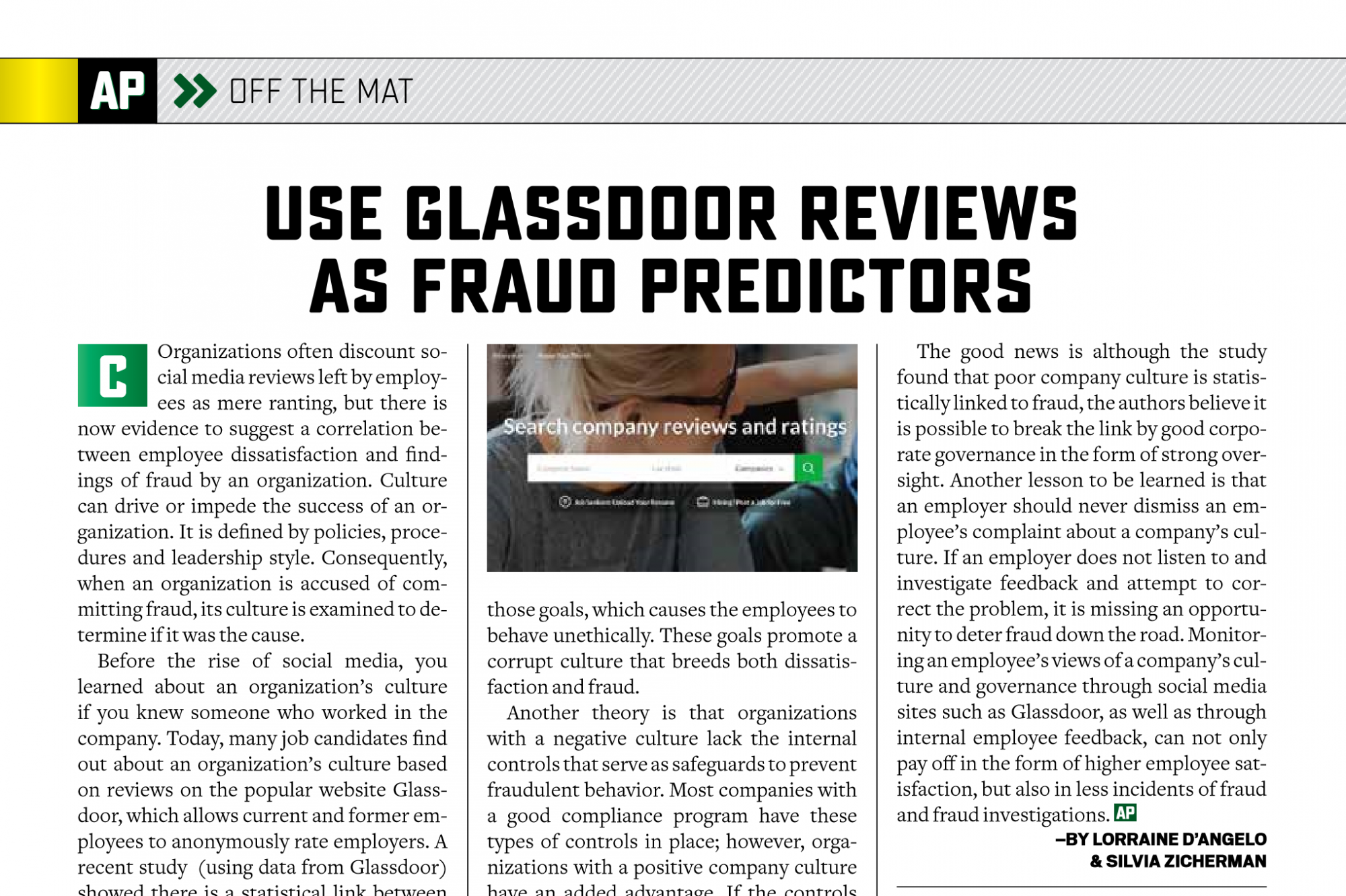Use Glassdoor Reviews as Fraud Predictors
BY Lorraine D'Angelo

By Lorraine D’Angelo and Silvia Zicherman
Organizations often discount social media reviews left by employees as mere ranting, but there is now evidence to suggest a correlation between employee dissatisfaction and findings of fraud by an organization. Culture can drive or impede the success of an organization. It is defined by policies, procedures and leadership style. Consequently, when an organization is accused of committing fraud, its culture is examined to determine if it was the cause.
Before the rise of social media, you learned about an organization’s culture if you knew someone who worked in the company. Today, many job candidates find out about an organization’s culture based on reviews on the popular website Glassdoor, which allows current and former employees to anonymously rate employers. A recent study (using data from Glassdoor) showed there is a statistical link between an organization’s poor culture and the likelihood that it would be investigated or prosecuted for fraud.
The authors of the study examined three measures of an organization’s culture in data submitted by Glassdoor users from 2008 to 2015: (1) ratings of an employer’s culture and values; (2) ratings of its senior leadership; and (3) ratings of employee job satisfaction. Next, researchers looked at the relationship between the measures of the organization’s culture and the likelihood that the federal government investigated that organization for fraud. They found that organizations with a poor culture are more likely to be investigated for fraud by the federal government.
According to the study, one theory as to why an organization’s negative culture can lead it into committing fraud is that companies with dysfunctional cultures are more likely to set ambitious performance goals, and then push employees to meet those goals, which causes the employees to behave unethically. These goals promote a corrupt culture that breeds both dissatisfaction and fraud.
Another theory is that organizations with a negative culture lack the internal controls that serve as safeguards to prevent fraudulent behavior. Most companies with a good compliance program have these types of controls in place; however, organizations with a positive company culture have an added advantage. If the controls fail, their culture serves as a safety net. The study found, “a strong-internal-control environment can block opportunities to commit fraud, regardless a firm’s culture, but in the absence of a strong internal-control system, rigorous corporate culture—such as one that promotes ethical conduct or whistleblowing—can decrease opportunities to commit fraud.”
While the study focused its research on the financial industry, the theories and conclusions reached are equally applicable to the construction industry. For example, in the July Off the Mat department, we discussed the fraud section of the U.S. Department of Justice’s (DOJ) new compliance guidance. One of the central themes is the role and responsibility undertaken by management and corporate compliance personnel in monitoring the company’s conduct and in creating an atmosphere of corporate responsibility. Essentially, the DOJ looks at the company’s culture to avoid fraud.
The good news is although the study found that poor company culture is statistically linked to fraud, the authors believe it is possible to break the link by good corporate governance in the form of strong oversight. Another lesson to be learned is that an employer should never dismiss an employee’s complaint about a company’s culture. If an employer does not listen to and investigate feedback and attempt to correct the problem, it is missing an opportunity to deter fraud down the road.
Monitoring an employee’s views of a company’s culture and governance through social media sites such as Glassdoor, as well as through internal employee feedback, can not only pay off in the form of higher employee satisfaction, but also in less incidents of fraud and fraud investigations.
Lorraine D’Angelo, a nationally recognized expert on legal and regulatory risk management, is the president of LDA Compliance Consulting Inc. She has more than 25 years of experience in the construction industry, including a recent tenure as senior vice president for ethics and compliance at a global construction company. D’Angelo is an accredited ethics and compliance professional and a leading expert on small, women-owned, minority and DBE matters, programs and policy implementation. For more information, contact her at (914) 548-6369 or Lorraine@ldacomplianceconsulting.com.
Silvia Zicherman is a consultant at LDA Compliance Consulting Inc. She is an attorney and has 12 years of experience in the construction industry as a former marketing director at a national construction law firm.
